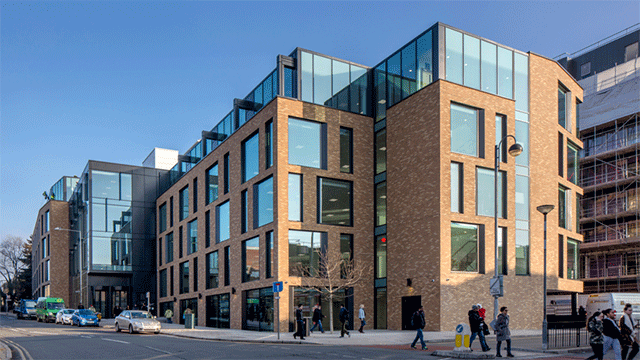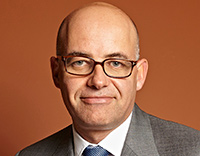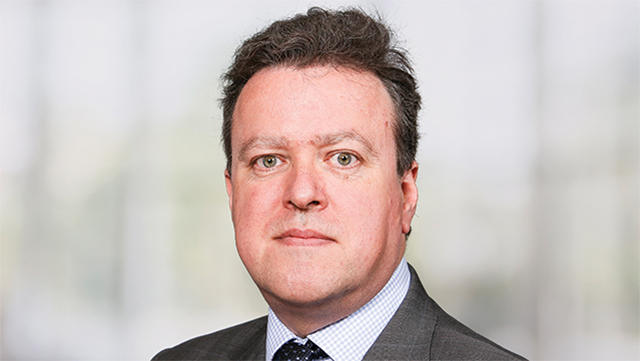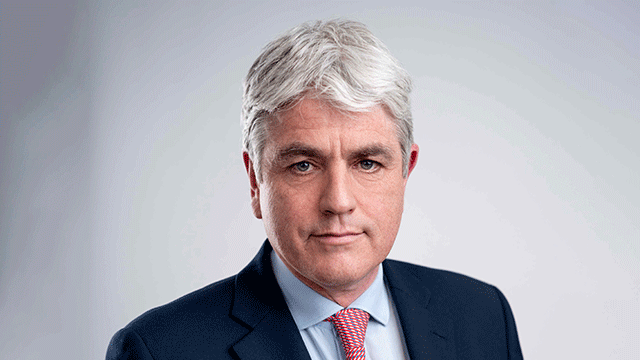Alex Jeffrey looks pleased. And with good reason. When he took over from Martin Moore as head of Prupim two summers ago, he had some of property’s biggest boots to fill. That he has filled them so quickly and so effectively has not gone unnoticed.
In his first 18 months at the helm, Jeffrey has already dispensed with the Prupim brand, diversified into new markets – one of which has earned him an unlikely sobriquet as the Arthur Daley of property – and delivered a record-breaking 2013. M&G was almost certainly the busiest investor in 2013, a year that saw £48bn invested in the UK, the biggest sum since the crash, according to CBRE.
St Martins and GIC both accounted for over £2bn of the total each; neither matched M&G’s own figure of £2.5bn.
Now, as M&G celebrates 150 years of property investment, Jeffrey must keep up the real estate momentum at the Prudential’s fund management arm. The market may be recovering, but challenges to investors are coming
thick and fast.
Up until now Jeffrey has kept a relatively low profile – no mean feat as the head of one of the biggest and best known UK real estate investors. But for this Sheffield United-supporting, French-speaking, globetrotting former banker, that’s all about to change. It will have to if M&G is going to seize opportunities in an increasingly crowded market.
The Call
Those “big job” calls so often act as signposts back through the passage of time. And it was no different for Jeffrey when the Man from the Pru called in 2011: “I was on a ski slope in Switzerland. You remember where you were when you receive calls like that.”
It was an irresistible offer after a 23-year career that took him from banking through to a stint in Singapore as chief investment officer of fellow fund manager MGPA. He may have held a string of roles in his 13 years with what is now a BlackRock business but it was no doubt his experience in Asia that helped persuade the M&G board that he had the wherewithal to succeed Moore.
“Clearly the growth in Asia has been quite significantly stronger than the rest of the developed world,” says Jeffrey. “In the UK we all operate in a market that is actually only 5% of global investable real estate. Investment institutions would like to spread their wings and get better diversification and access to stronger growth.”
Jeffrey’s focus at M&G is to grow a business which has £17bn of assets under management, a fraction of M&G’s total funds under management of £234bn. In doing so his priorities lie beyond these shores.
“Within five years, I would hope we would have 50% of our capital invested outside the UK. It’s approximately 80% in the UK and 20% globally, and that 20% is split roughly a third, a third, and a third between North America, continental Europe and Asia. But we see significant growth outside the UK, especially in Asia. In terms of our client balance, our aspiration would be 50/50 between internal and external capital within five years. Currently it’s about 70/30 in favour of internal.”
A long road
Looking back over Jeffrey’s career (and even further into the past), the path to his current role was always heading in the right direction. His father ran a furniture retail business, Cantors. He married into the family company, set up by Jeffrey’s great-grandmother, building up over the decades to a hundred-strong retail chain.
“I don’t think the company made a lot of money in furniture retail,” he confesses. “It made all of its money in property; it owned quite a lot of freeholds and long leaseholds. Quite a few of those leaseholds were from the Pru, and I discovered recently that five of our stores, which now trade as Harveys, which bought Cantors in the 1980s, were negotiated by my dad during that decade.”
Like British Land’s Chris Grigg and Quintain’s Max James, Jeffrey’s path to property’s summit began in the City. “Perhaps there isn’t that much of a coincidence, because property tends to be quite finance intensive,” he says.
But he hankered after bricks and mortar and after more than a decade at HSBC and JP Morgan, he moved to Lend Lease in 1999. He joined weeks after Bluewater opened – at the time the largest shopping centre in Europe and a project funded by you know who. “That was the first time I came across the Pru in property, because everybody in Lend Lease talked about it, and particularly about Martin Moore, in reverential terms. The Pru shared Lend Lease’s vision to deliver the biggest and best shopping centre in Europe, in a chalk pit, in what was at the time a place in the middle of nowhere in Kent. It was a successful investment, but had it not been for the Pru’s and Martin’s vision, it wouldn’t have been delivered.”
In 2002 he joined a division within Lend Lease that dealt with international fund management, a decision the business soon reversed. Jeffrey and colleagues pursued a management buyout in 2004, a business that became MGPA. “We were independent for a few months, and then Macquarie came in and took a cornerstone investment and the business became known as Macquarie Global Property Advisors and then MGPA.”
Like others who have gone from a relatively privileged corporate life to a start-up – Max James tells a similar story – it was a time as exciting as it was hair-raising. “It was a baptism of fire,” says Jeffrey. “I was asked to be the CFO of the business initially, and that meant I had to lead the negotiations with Lend Lease, which was an interesting experience, because I had been the head of corporate finance at Lend Lease and moved to be the CFO of this business, and they didn’t replace me in my previous role. So I was effectively negotiating with an empty chair.”
Jeffrey was juggling investment decisions with determining whether the start-up could afford cleaners and coffee machines. “It was a slightly scary time. We had one fund that we were managing, and it was a closed-end fund. At the end of its investment period, had we not raised any more money, it would have been a dwindling business. We did go out on the road and we raised money, primarily in North America, but that really focused the mind, because you realised that if people were not going to sign on the dotted line, that was the end of the business you just bought.”
After running the European side of MGPA’s operations, Jeffrey changed course at what was by 2010 an Asia-centric business. He upped sticks and moved to Singapore but continued to spend much of his time on planes.
“Asia is a very broad market, and each of the different countries have different characteristics. People talk about Asia as one region, but it’s vast. They’re very different markets, and they’re all fascinating in their own individual ways.”
The experience taught him valuable lessons. “The London business market, particularly the City, is quite volatile, but it’s nothing on Hong Kong. I think rents have gone from less than 10 Hong Kong dollars to nearly 200, and back again.” Japan especially continues to fascinate him.
Off the beaten track
There have been unexpected moves along the way, “being creative in searching for yield” in Jeffrey’s words, including the acquisition 18 British Car Auction sites across the UK for £240m (hence the Arthur Daley jibe). And he’s as interested in PRS as any institutional investor.
Already bearing fruit at M&G is a partnership with Berkeley Homes, from which it acquired 534 homes. “We will be doing more of that, and it might be, not just buying standing investments, but also funding developments. But we will also be doing the longer-time type of investment. You will have seen that we did a transaction with Genesis Housing Association earlier in the year, at Stratford Halo, next to the Olympic Stadium, which was about a £125m investment.”
What he won’t be doing is mirroring Legal & General’s Cala Homes swoop any time soon. “I doubt that you will see us buying stakes in house builders,” he says. “We’ve been very busy in residential recently, but actually, it’s almost like a reinvestment by the Pru. If you go back to the early part of the 20th century, the rented sector was actually the majority of the residential stock in the UK, and at that time the majority of that stock was owned by institutions, of which one of the largest was the Pru.”
Many in UK property are wondering where the march of global money into UK property leaves domestic institutions. Not Jeffrey. In the first few short weeks of 2014, he has welcomed a new chief investment officer – Tony Brown, former Lend Lease EMEA MD – acquired Riverside House on the South Bank of the Thames for £122m and submitted plans for Lumina, a 240,000 sq ft Grade A office building in Birmingham’s city core.
M&G’s next 150 years have begun as busily as its first ended.
People have changed but the prudential’s principles have remained the same for 150 years
1864. The American civil war is raging. The first edition of the cricket Bible, Wisden, is published. And the condom, in it modern guise at least, is born.
M&G, meanwhile, is making its first investment. “A gentlemen called Edgar Horn set up the business within the Pru,” says Alex Jeffrey.
“He was one of the eight founders of the Pru, and our first investment was actually Holborn Bars. That was the traditional headquarters of Prudential, and that was our first development in fact.
We made a number of investments after that. In 1902, I believe we made our first retail property investment, in Brighton, and the business built from there. I’m not sure if that makes us the oldest property investor in the world, but it must be one of the oldest and longest standing.
“I think the interesting thing is that the principles of Prudential investing in property have endured during that time. Obviously the people have changed, but the principles of being long term and cautious are very much there.”
damian.wild@estatesgazette.com











